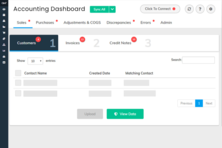Inventory management software assists small businesses in automating sales-related processes and tracking the overall levels of stocks, orders and deliverables. These systems are focused on automation and optimization—quick solutions for tasks in need of constant managing and organizing. For small businesses dealing with products and inventory, an Excel spreadsheet isn’t enough to sufficiently keep up with the workload. Many factors are involved in managing a small business. A cloud-based software solution keeps all those aspects in a centralized location where everybody can have access to them.
Managing inventory is a difficult feat to accomplish without the right tools. Since small businesses can have up to multiple warehouses with different sales channels, many things come and go. It isn’t enough to have spreadsheets as they are prone to errors. Furthermore, they aren’t as convenient and fully-featured as software solutions.
To effectively track your inventory, you need to have a system to check a lot of information regarding an item. This includes their prices and barcodes. In the event where you need to search these within a server, you can immediately zero in on what you need.
Three types of inventory management software exist in the current market:
For small businesses, cloud-hosted inventory management software is the best option to go for. It provides real-time data on your inventory and offers features related to management, finance and logistics. The more products you own, the harder it is to keep up with them. A cloud-hosted software takes this fact into consideration and can scale alongside business as it grows. It keeps up with the demand and ensures you’re never behind when it comes to purchasing orders. As a result, small businesses typically don’t encounter problems in their system as they steadily thrive.

 Cin7 offers a fully-featured inventory management system that helps small businesses by combining production, warehouse management, as well as B2B and retail POS capabilities into one solution.
Cin7 offers a fully-featured inventory management system that helps small businesses by combining production, warehouse management, as well as B2B and retail POS capabilities into one solution.
Small business owners make use of inventory management software for inventory control, accounting management and several other benefits. It becomes easier to track your inventory, update stocks and supplies, track profits and more. Solutions such as this maximize your existing inventory and ensure no customer will be left without an order.
Several inventory systems are available in the current market. They differ from each other, especially in terms of their type, price, range and audience. Some solutions are a better fit for large companies with local and international range. Others are equipped with advanced features that benefit businesses with several channels. In order to find out which software solution is suitable for you, it can be worthwhile to try out and compare their free trials.
Cin7, a fully-integrated cloud-based management solution, is a perfect fit for omnichannel sellers as it provides features geared towards helping manage several platforms at the same time. If you have physical and online stores, managing your inventory is critical. With features such as point of sale, warehouse management, automation, built-in EDI and a payment portal, Cin7 is a powerful inventory management tool for small businesses to have.
Most of the features integrated in Cin7 can be found with several other software solutions. These features are useful and integral in tracking your overall inventory. They are as follows:
As one of the most sought out features in inventory management software, production planning deals with aspects related to your stocks and supplies. It has drag-and-drop capabilities, which are useful in knowing which tasks are high on the priority list. Additionally, it tracks the production of orders. If there’s a delay, you can easily backtrack and find out where the problem is. Lastly, it provides you with real-time statuses regarding all production-related processes. This helps you address problems as they emerge.
Inventory control refers to the ability to manage both finished products and raw materials across multiple warehouses and channels. Transactions and restocking are automated to ensure a speedy process. When inventory levels become low, you are able to easily control the number of stocks to order. Additionally, since products come in all shapes and sizes, variants in items can be managed as well.
Floor-level control allows you to manage each employee working in the warehouse. You are also provided a dashboard, complete with the working person, product names, type of operation and expected time for the job to finish. Statuses are paired with each task list, making it easier to see their progress. Instructions for each task are also clearly given to the employees.
Purchasing supplies is critical in a blooming business. Any delay from the supplier side can negatively impact the entirety of your operations, which is why it comes with its own tracking tool. This feature allows you to have a view of your stock levels and ensure timely purchases. When raw materials start to drop, you can quickly order new batches to compensate.
Integration is essential in inventory management software solutions. You can synchronize other tools in order to improve your business, such as CRM systems and eCommerce platforms. Accounting has also become easier as the feature syncs invoices, transfers bills and keeps contacts in sync. Secondly, it integrates with QuickBooks, which assists in accounting and inventory management. This allows you to perform a variety of tasks from a single software solution.
Small businesses are faced with a competitive industry. Without the right tools, you could easily get left behind in the dust. In order to keep up with the demand of the people and ensure low stocks won’t happen, people turn to inventory management software. As a business grows, so does the demand. But manually putting in information to your system can lead to several errors such as overselling and stock mismanagement.
Three main benefits are given to small businesses when they use inventory management software:
With an inventory system, efficiency and speed are both guaranteed to run through your business. Not only will you be able to cope with the demand of the public but also all daily operations are quickly automated. This allows you to make profitable decisions regarding your stocks. Furthermore, the software solution immediately notifies you regarding any changes in the inventory levels, eliminating the risk of low supplies or erroneous demand forecasting.
When it comes to cloud-based software, it is a given that all transactions and records are well documented. If you require paperwork on certain products or POS transactions, you no longer have to manually create the report yourself. This saves you a lot of time and reduces the risk of any inaccuracies and errors. Documents such as account statements, purchase orders, checks and invoices sent to the customers or within the company can easily be generated.
Not only will you be able to generate reports with just the click of a mouse but they are also backed up with analysis and insights. You won’t be faced with a dizzying array of numbers to interpret. Instead, the system does it for you. You can find out which items are still in stock, how many have been sold and which ones are being sold quickly. With this inventory data, you can focus on pushing out the well-received items to customers and find better strategies for the ones still sitting on shelves.
Overall, inventory management software has the ability to streamline tasks and automated operations. With more time on your hands, you don’t have to worry if stocks are running low or if there’s an excess of it. A scalable, flexible and visible inventory system allows you to set your business to your standards. But the most important benefit you can enjoy from this solution is the fact that as your business grows, you are able to cope with any changes, both positive and negative.